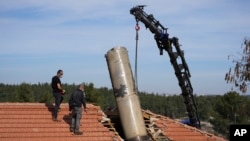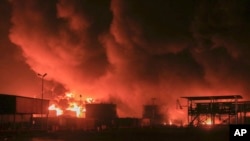Yemen’s Iran-backed Houthi terror group appears to be well-positioned to shield its leaders from retaliatory strikes recently threatened by Israel, international researchers tell VOA.
Israel also faces its own challenges in potentially engaging in long-distance targeting of Houthi leaders, but those researchers say the Israeli threat to Houthi rule is likely to grow in the future.
Israel has carried out five long-distance airstrikes on Houthi infrastructure and other targets in Yemen since last July, in retaliation for the Houthis firing hundreds of drones and missiles as part of an Iranian proxy war launched against Israel in October 2023.
The Biden administration had labeled the Houthis a Specially Designated Global Terrorist organization last January, citing their use of missiles supplied by Iran to attack Red Sea shipping. President Donald Trump, who took office this week, signed an order on Wednesday starting a monthlong process of further penalizing the Houthis with a designation as a Foreign Terrorist Organization.
After Israel’s latest Yemen strike on Jan. 10, Defense Minister Israel Katz issued a videotaped warning to Houthi leaders, saying Israel will “hunt you down” – repeating a threat that he first made last month to “decapitate” the Houthi leadership. Houthi leader Abdul-Malek al-Houthi issued a defiant videotaped message of his own on Monday, saying his militia will monitor an Israel-Hamas ceasefire that took effect a day earlier in Gaza and “escalate” conflict with Israel “if (it) breaches” the deal.
The Houthi leader is known for being elusive and issuing videotaped statements from undisclosed locations.
Mohammed Albasha, a Yemeni American former journalist and founder of U.S.-based consultancy Basha Report that specializes in Middle East and North Africa risk assessments, told VOA that he has not observed any public meetings involving al-Houthi in Yemen since 2015. That is when a Saudi-led coalition began an offensive to try to oust the Houthis from the Yemeni capital, Sanaa, which the militia stormed into the year before.
In a series of interviews for this report, Albasha and other international researchers specializing in Yemen said they suspect that al-Houthi has been hiding for years in the mountains of his clan’s home base of Saada province in northwestern Yemen, along with other senior figures of his militia.
“I don’t think Israeli threats have changed the behavior of Houthi leaders much,” said Wolf-Christian Paes, a researcher at the International Institute for Strategic Studies.
“Since 2015, they have fought Saudi and Emirati forces who tried to target their leadership, which made them very security conscious,” Paes said. “Al-Houthi has rarely met U.N. or other foreign visitors in person or given interviews to journalists.”
Ely Karmon, a researcher at Israel’s International Institute for Counterterrorism, said Houthi leaders appear to have tightened those precautions in response to recent developments, including Israel’s five strikes on Yemen, dozens of U.S.-led strikes on Houthi targets in Yemen since last January, and Israeli attacks on Iranian proxy leaders elsewhere in the region.
Karmon noted that 10 days after Israel’s first airstrike in Yemen on July 20, 2024, the Houthis’ patron, Iran, held a swearing-in ceremony for its new president, Massoud Pezeshkian, and al-Houthi did not travel to the Islamic republic to attend. Hamas political chief Ismail Haniyeh, another Iranian proxy leader, did travel to the Iranian capital for the inauguration and was assassinated in an Israeli bombing hours after the event.
April Longley Alley, a researcher at the U.S. Institute of Peace, said the Houthis also are likely to be skeptical of using transmitting technology anywhere near their top leader. Israel used communications devices to attack Hezbollah on consecutive days in September, first detonating thousands of rigged pagers and then hundreds of rigged walkie-talkies that it surreptitiously delivered to the Lebanese terror group.
Ten days after the pager attack, Israel assassinated Hezbollah chief Hassan Nasrallah in an airstrike on his southern Beirut stronghold, giving the Houthis more cause to bolster the protection of al-Houthi, the researchers said.
Beyond the Houthis’ home base in Saada, the militia has a political leadership running an internationally unrecognized authority in Sanaa, called the Supreme Political Council.
Albasha, the former journalist, said the council’s prime minister and other ministers are not involved in military matters and operate under the authority of the militia’s senior commanders from Saada and the Houthi clan.
The researchers said Houthi political leaders and spokesmen appear regularly in public in Sanaa, but typically in settings with many civilians present, giving those officials a human shield from potential aerial attacks.
In the latest such appearance on Wednesday, the Houthis’ Supreme Political Council prime minister, Ahmed Ghaleb Nasser al-Rahawi, appeared at a government auditorium where several hundred people gathered to commemorate the 2004 killing of Hussein al-Houthi, a brother of the militia’s current leader, by forces of Yemen’s then-President Ali Abdullah Saleh.
But the researchers said the Houthis’ tactics for shielding their leaders from attack also have drawbacks.
“Houthi military leaders are going to be very skeptical of using phones, and that is likely going to make it harder and more time consuming for them to exchange messages between Saada and Sanaa,” Longley Alley said.
Ari Heistein, an Israel-based researcher with the Counter Extremism Project, said Houthi military leaders risk losing relevance in running their regime if they disconnect from electronic communications for prolonged periods.
“Running a country of more than 32 million people with serious problems is hard to do from isolation in a remote environment,” Heistein said.
The researchers said it is harder for Israel to strike leaders of the Houthis than those of Hezbollah and other Iranian proxy groups located nearer its borders because Yemen is more than 2,000 kilometers away. That distance requires several hours of flight time for Israeli warplanes to reach their targets, versus minutes for the same warplanes to reach neighboring territories.
They said Israel also lacks in Yemen the same kind of human intelligence sources that it established in Lebanon and Palestinian territories before the start of the recent conflict, when it perceived Yemen to be a relatively low threat.
Karmon, the counterterrorism researcher, said that if the ceasefire in Gaza holds and the Houthis refrain from firing more projectiles at Israel in the coming weeks and months, he expects Israel to focus on closing what he called a “huge” intelligence gap in Yemen.
He said Israel could utilize long-range drones, satellites, human sources and intelligence-sharing with the U.S. and regional partners to do that.
Heistein said Israel likely will use its surprise September attacks on Hezbollah, which were years in the making, as a model for dealing with threats from Yemen.
“If the Houthis quiet down for a while, the next time they begin causing trouble, particularly for Israel and international shipping, Israel probably will have a plan in place to take out their leadership,” Heistein said.




